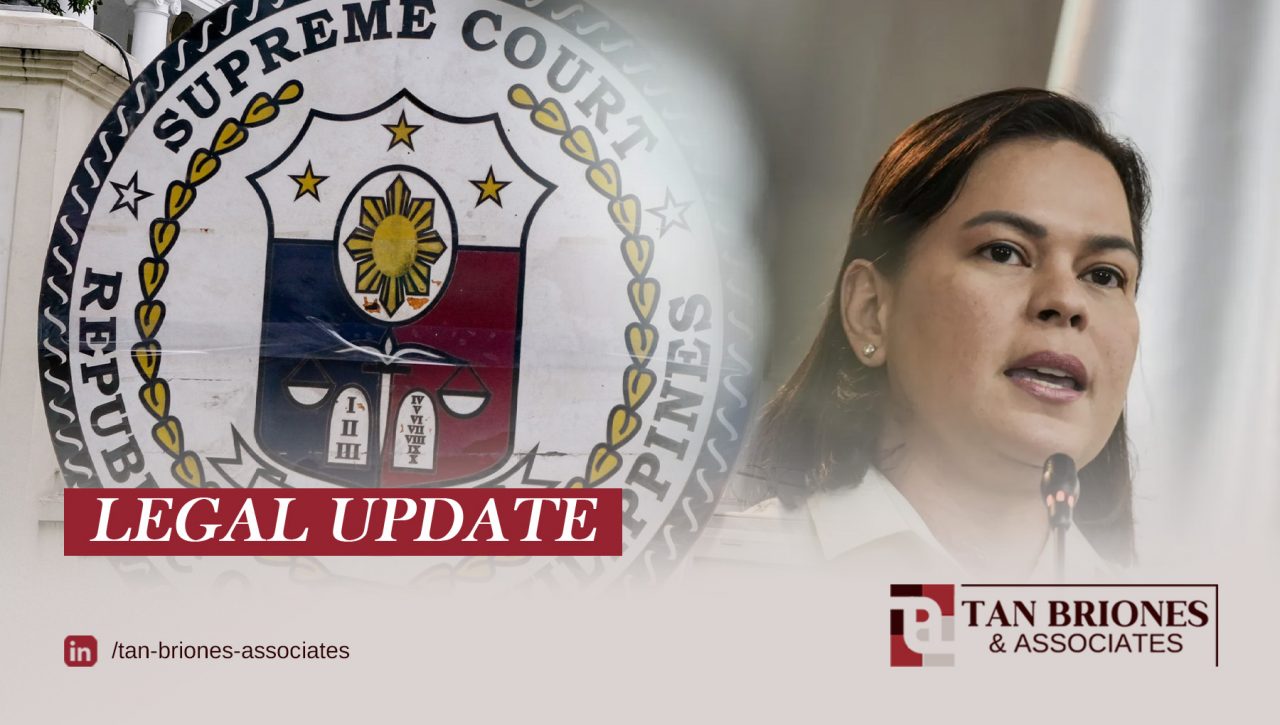
The Supreme Court (SC) has nullified the Articles of Impeachment against Vice President Sara Z. Duterte, ruling that the fourth complaint was filed in violation of the one-year bar and denied her the right to due process.
In a decision penned by Senior Associate Justice Marvic M.V.F. Leonen, the Court held that the impeachment process, while political in nature, remains a legal and constitutional procedure subject to judicial review.
“The Articles of Impeachment violated due process of law, as the draft and its accompanying evidence were not made available to the respondent, thereby denying her the opportunity to be heard by the members of the House of Representatives,” the Court said.
“The Articles of Impeachment, besides being barred, are also constitutionally infirm and therefore null and void ab initio,” it furthered.
FACTS AND ISSUE
In December 2024, three groups—including civil society leaders, religious workers, and party-list representatives—filed separate impeachment complaints against Vice President Duterte, alleging graft, betrayal of public trust, and gross misuse of confidential funds.
These first three complaints were endorsed by various members of the House of Representatives and were filed under Article XI, Section 3(2) of the Constitution, which provides for the first mode of initiating an impeachment complaint. Under this provision, any member or citizen with a member’s endorsement may file a verified impeachment complaint, which must be included in the Order of Business within ten session days and referred to the proper committee within three session days.
However, the Office of the Secretary General did not act on the three impeachment complaints until they were archived on February 5, 2025—the tenth session day after the first complaint was filed and the last session day before Congress adjourned—when a fourth impeachment complaint was filed and adopted.
The fourth complaint, filed through the second mode of initiating an impeachment complaint under Article XI, Section 3(4) of the Constitution, was directly signed by 215 lawmakers—more than the one-third requirement—thereby constituting the Articles of Impeachment and prompting its same-day transmission to the Senate without plenary deliberation.
Following this, petitions were then filed before the SC by Vice President Duterte and a group of lawyers led by Atty. Israelito Torreon (docketed as G.R. Nos. 278353 and 278359), challenging the constitutionality of the fourth complaint.
The petitioners argued that the new filing was barred by the one-year prohibition under Article XI, Section 3(5) and violated due process because Duterte was not given a chance to respond before the Senate proceedings commenced.
The petitioners also raised questions about the authenticity and verification of the signatories and contended that the fourth complaint was railroaded without adequate deliberation.
THE RULING
In its ruling, the SC granted the Petitions for Certiorari and Prohibition and declared the fourth impeachment complaint unconstitutional. It ruled that the House of Representatives committed grave abuse of discretion by transmitting the Articles of Impeachment without observing the constitutional requirements of due process and the one-year bar.
The Court emphasized that impeachment, although political in character, is governed by legal and constitutional parameters that must be strictly followed. It stressed that impeachment complaints cannot be insulated from judicial scrutiny, especially when fundamental rights are implicated.
“The process of impeachment is a constitutional and therefore legal process that takes place within a political environment. That it is sui generis does not convert it to a purely political process isolated from the requirements of the Constitution as a whole,” the Court ruled.
Moreover, it also clarified that the one-year bar applies not only to complaints that are explicitly dismissed but also to those that are archived or left unacted upon. The ruling concluded that the fourth complaint was filed in violation of this provision.
Further, the Court found that the fourth complaint failed to meet due process standards as it was not deliberated in plenary, lacked proper dissemination of supporting evidence to all House members, and denied the respondent the opportunity to be heard before the Senate trial.
As a result, the Court declared the Senate had not acquired jurisdiction over the impeachment case. It added that new impeachment complaints, if any, may only be filed against Vice President Duterte no earlier than February 6, 2026.
“Our ruling does not absolve petitioner Duterte from any of the charges. Any ruling on the charges against her can only be accomplished through another impeachment process, followed by a trial and conviction by the Senate,” the Court clarified.
While the ruling was unanimous and immediately executory, with 13 justices concurring, one abstaining, and one on leave, the parties may still file a motion for reconsideration within 15 days from the date of the Court’s decision.
Follow Tan Briones & Associates on LinkedIn for more legal updates and law-related articles.







